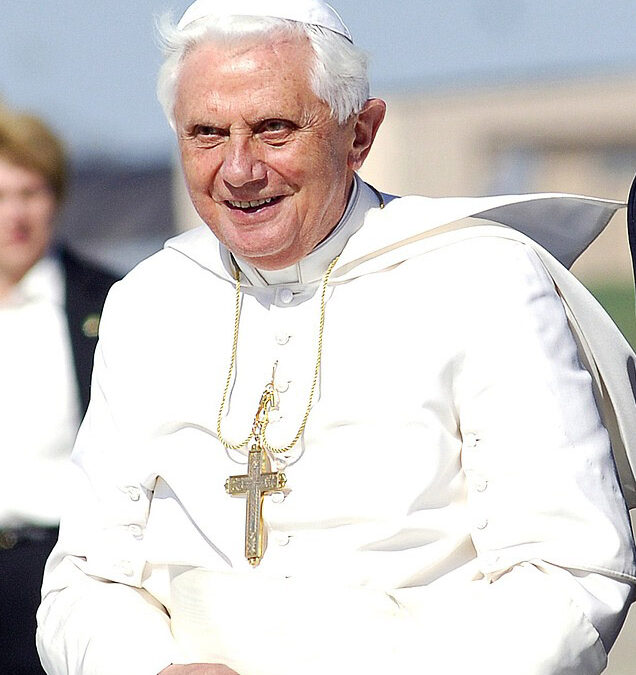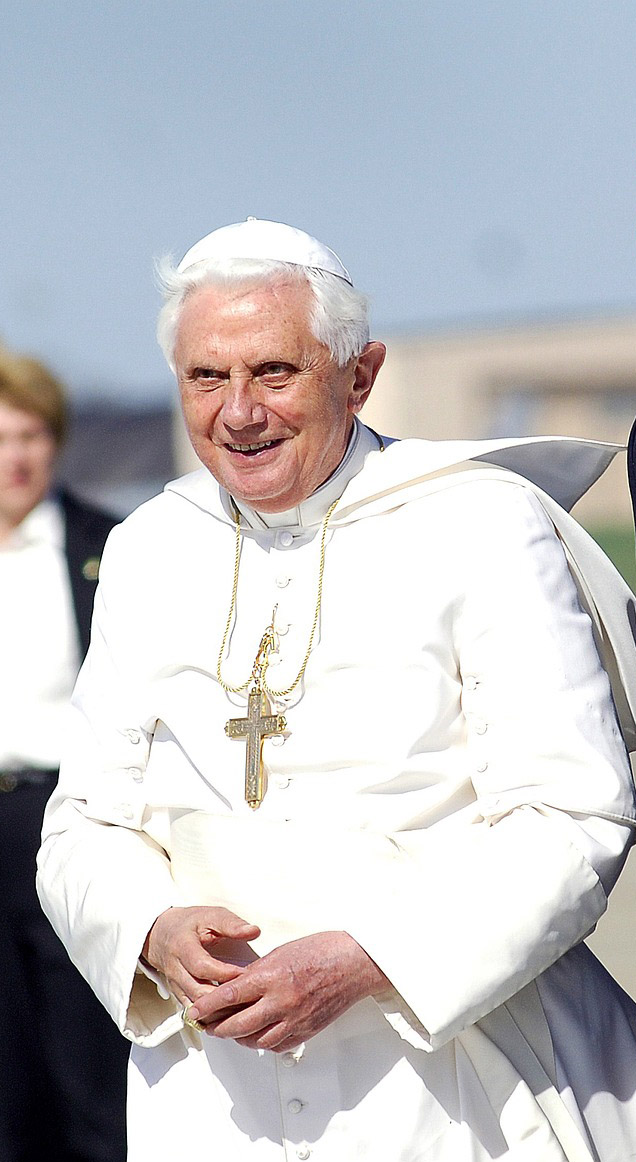
“The final word in the history of the world will be communion”
Statement by Margaret Karram, President of the Focolare Movement on the death of His Holiness, Pope Benedict XVI Respect, appreciation, and emotion fill my heart as I express deepest gratitude for the life and work of Pope Benedict XVI. I do so on my own behalf and on behalf of the Movement that he followed and accompanied with love and closeness . With the whole Church we gather around Pope Francis as we give him back to God, certain that he has already been received into the glory of Heaven and I will do so personally on the 5th January when I attend his funeral in St Peter’s Square. In May 2009, I had the privilege of welcoming Pope Benedict to Jerusalem, as I participated in various stages of his pilgrimage to the Holy Land. Two of those moments remain with me in particular: his words at the Holy Sepulchre, “Peace is possible here”. He continued, saying: “The Empty Tomb speaks to us of hope, the same hope that does not disappoint, because it is the gift of the Spirit of life.” Being able to attend a private Mass in the Apostolic Delegation in Jerusalem, celebrated by Pope Benedict XVI himself was very powerful for me. I sensed his fatherly tenderness and the greatness of his charity that was expressed in a gesture of gratitude for all that the Focolare Movement had done to help prepare for his visit.  In 1989, when he was still Prefect of the Congregation for the Doctrine of the Faith, Cardinal Joseph Ratzinger was invited by Chiara Lubich for a dialogue with the focolarine gathered for their annual spiritual exercises, in which I too was participating. He answered a wide variety of questions and at one point spoke words that I have never forgotten. Concerning the future of the Church and humanity, he said: “The final word in the history of the world will be communion, becoming communion, not only among ourselves but, by being incorporated in Trinitarian love, becoming universal communion, where God is all in all”[1]. Today, as our beloved Pope Benedict XVI has returned to the house of the Father, these words of his resound within me almost like a spiritual testament. They are words of extraordinary relevance, which today shed light and hope on humanity afflicted by conflicts of which we see no end. We were nourished by his enlightened thought, that of a great theologian who, while still very young, took part in the Second Vatican Council, He conveyed and presented over the years the newness of a Church as communion, formed of knowledge of the Word and charity translated into practice. Following his election as Pope, Chiara Lubich affirmed: ‘From my personal knowledge of him, and because he has special gifts with which to grasp the light of the Spirit, he will not fail to surprise us and exceed all expectations’[2]. Let us not forget the key role he played in 1998, when Pope John Paul II invited the Ecclesial Movements and New Communities to St Peter’s Square on the feast of Pentecost. On that occasion, Cardinal Ratzinger gave a very significant lecture entitled: “The Ecclesial Movements: a Theological Reflection on their Place in the Church”, in which he outlined the profile of the movements and new communities and their essential relationship with the Church. Some parts of his talk continue to be a great light for me and for the Movement, enabling us to be instruments of communion in the Church and Christ’s outreached arms towards humanity. He said: “(…) the Holy Spirit is quite plainly at work in the Church and is lavishing new gifts on her in our time too, gifts through which she relives the joy of her youth (cf. Ps 42:4 Vulgate). Gratitude for the many people, young and old, who accept God’s call and joyfully enter into the service of the Gospel without looking back. Gratitude for the bishops who open themselves up to the new movements, create room for them in their local Churches, struggle patiently with them in order to overcome their one-sidedness and guide them to the right form.”[3] Together with the whole Church, I thank God for the gift that Pope Benedict XVI has been for our time and I pray that we will know how to grasp and translate into life the depth of his theological thought, his faithfulness to the Gospel and the courage of a life of witness that can lead the Church on the paths of truth, fraternity and peace.
In 1989, when he was still Prefect of the Congregation for the Doctrine of the Faith, Cardinal Joseph Ratzinger was invited by Chiara Lubich for a dialogue with the focolarine gathered for their annual spiritual exercises, in which I too was participating. He answered a wide variety of questions and at one point spoke words that I have never forgotten. Concerning the future of the Church and humanity, he said: “The final word in the history of the world will be communion, becoming communion, not only among ourselves but, by being incorporated in Trinitarian love, becoming universal communion, where God is all in all”[1]. Today, as our beloved Pope Benedict XVI has returned to the house of the Father, these words of his resound within me almost like a spiritual testament. They are words of extraordinary relevance, which today shed light and hope on humanity afflicted by conflicts of which we see no end. We were nourished by his enlightened thought, that of a great theologian who, while still very young, took part in the Second Vatican Council, He conveyed and presented over the years the newness of a Church as communion, formed of knowledge of the Word and charity translated into practice. Following his election as Pope, Chiara Lubich affirmed: ‘From my personal knowledge of him, and because he has special gifts with which to grasp the light of the Spirit, he will not fail to surprise us and exceed all expectations’[2]. Let us not forget the key role he played in 1998, when Pope John Paul II invited the Ecclesial Movements and New Communities to St Peter’s Square on the feast of Pentecost. On that occasion, Cardinal Ratzinger gave a very significant lecture entitled: “The Ecclesial Movements: a Theological Reflection on their Place in the Church”, in which he outlined the profile of the movements and new communities and their essential relationship with the Church. Some parts of his talk continue to be a great light for me and for the Movement, enabling us to be instruments of communion in the Church and Christ’s outreached arms towards humanity. He said: “(…) the Holy Spirit is quite plainly at work in the Church and is lavishing new gifts on her in our time too, gifts through which she relives the joy of her youth (cf. Ps 42:4 Vulgate). Gratitude for the many people, young and old, who accept God’s call and joyfully enter into the service of the Gospel without looking back. Gratitude for the bishops who open themselves up to the new movements, create room for them in their local Churches, struggle patiently with them in order to overcome their one-sidedness and guide them to the right form.”[3] Together with the whole Church, I thank God for the gift that Pope Benedict XVI has been for our time and I pray that we will know how to grasp and translate into life the depth of his theological thought, his faithfulness to the Gospel and the courage of a life of witness that can lead the Church on the paths of truth, fraternity and peace.
Margaret Karram President Focolare Movemente
[1] Cardinal Joseph Ratzinger’s visit to the meeting of the women focolarini, answers to questions. Castel Gandolfo, 8th December 1989. Chiara Lubich Archive, in the General Archives of the Focolare Movement. [2] Statement by Chiara Lubich in the Focolare Movement’s Press Release of 20th April 2005 [3] “Ecclesial Movements, a theological reflection on their place in the Church,” Joseph Cardinal Ratzinger. Proceedings of the World Congress of the Ecclesial Movements Rome, 27-29 May 1998.
